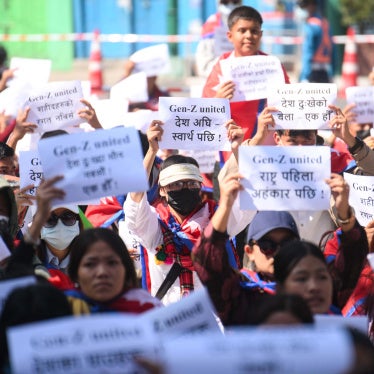(New York) -- Leaders of Asia-Pacific Economic Cooperation (APEC) nations at their meeting in Bangkok on October 20-21 must forge a common position to isolate and pressure the Burmese military government to respect human rights and return Burma to civilian rule, Human Rights Watch said today.
Burma's pro-democracy leader, Aung San Suu Kyi, was arrested on May 30 following a deadly attack by Burmese security forces on a convoy of National League of Democracy (NLD) supporters. In the wake of Suu Kyi's arrest, Burma's military government, known as the State Peace and Development Council (SPDC), has been under pressure from the United Nations, the United States and the European Union to release the Nobel Peace laureate and to engage in genuine political negotiations with the political opposition. But this pressure has been undermined by continued support for the SPDC from China and Thailand and other Association of Southeast Asian Nations (ASEAN) countries.
"Continued economic and political support from some ASEAN members and China has undermined attempts to send a clear message to Burma's military rulers that it is time for them to make way for an elected civilian government," said Brad Adams, executive director of Human Rights Watch's Asia division. "The APEC meeting is the perfect opportunity for the international community to take a united stand against a government that systematically abuses human rights, provokes refugee flows to neighboring countries, and destabilizes the region."
Human Rights Watch noted that Malaysia and Indonesia, although closely allied to the SPDC, have called for the release of Suu Kyi, who remains under house arrest after months in detention. Last week the United Nations special envoy to Burma, Razali Ismail, was rebuffed when he demanded her release.
"While the Burmese military government claims that it has a 'roadmap' to democracy, there is no evidence that any such plan exists or that it has any intentions of engaging in good faith negotiations with the political opposition," said Adams. "Thailand and others in ASEAN should no longer accept the fiction that such a 'roadmap' exists and should insist that Burma's military leaders sit down with the opposition and the ethnic minority parties and hash out a plan for a return to an elected, civilian government."
While public demands from ASEAN countries for Suu Kyi's release are welcome, Human Rights Watch said that a more significant step would be for countries with close relations with the SPDC-such as China, Thailand, Malaysia, Singapore and Indonesia-to halt the economic and political support that allows the SPDC to continue in power. Limitations on trade and investment with Burma by the United States and limitations on aid by the United States, Japan, and the European Union are being seriously undermined by continued private international investment and military aid from other countries, particularly China.
Human Rights Watch urged Prime Minister Thaksin Shinawatra of Thailand, which is hosting the APEC meeting, to relax the Thai government's recent crackdown on Burmese refugees and migrants in Thailand and to drop plans to repatriate Burmese citizens into the hands of the SPDC. A disproportionate number of Burmese in Thailand are members of Burma's ethnic minority groups.
"So long as Burma's military government continues to use violence, forced displacement and forced labor, people fleeing Burma will have nowhere to go but Thailand," said Adams. "Mr. Thaksin should be told that forced repatriation to Burma in these circumstances is a violation of international law and will not be tolerated. The participation of the ethnic minority groups is essential to a political settlement in Burma, but Thailand seems determined to close the political space of Burmese in Thailand in order to bolster its relations with Burma's military government."
Human Rights Watch urged donors to step up support for Thai human rights nongovernmental organizations and those organizations offering support for Burmese refugees and migrants, including the United Nations High Commissioner for Refugees.
Though APEC is primarily an economic forum, it has put the issue of terrorism at the heart of its agenda for the past two years. Human Rights Watch urged APEC to take human rights just as seriously, particularly when it is meeting next door to one of the world's most abusive regimes. Such issues have been addressed at APEC before, notably with reference to the situation in East Timor in 1999.
"The situation in Burma has reached such a critical stage that APEC's leaders cannot ignore it," said Adams. "If they offer the excuse that their meetings are about economics and not about human rights, they will send the message to Burma that they are not serious about the need for change. It is rare that all the key players on Burma are at the same table. This in an opportunity that should not be missed."






